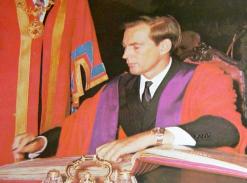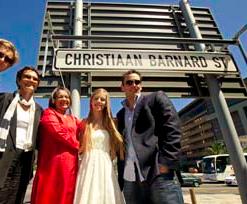
Barnard honoured with street name
Dr Christian Neethling Barnard – famous for performing the first ever human heart transplant – was honoured in early December by the City of Cape Town, which named a street after the brilliant South African cardiac surgeon. The ceremony took place exactly 44 years after Barnard’s astonishing medical achievement on 3 December 1967. The operation lasted […]

Dr Christian Neethling Barnard – famous for performing the first ever human heart transplant – was honoured in early December by the City of Cape Town, which named a street after the brilliant South African cardiac surgeon.

The ceremony took place exactly 44 years after Barnard’s astonishing medical achievement on 3 December 1967. The operation lasted nine hours and was accomplished after a thrilling race with other surgical teams around the world who were also on the verge of carrying out the same landmark procedure.
Oswald Pirow Street, north-east of the city centre, is now known as Christiaan Barnard Street.
Cape Town’s executive mayor Patricia de Lille described the Western Cape-born Barnard as “one of Cape Town’s greatest sons”.
De Lille went on to say, “We honour what is best about our city by acknowledging the pioneer of one of the 20th century’s greatest triumphs.”
The famous surgeon, who died in September 2001, is already commemorated in Cape Town by the Netcare Christiaan Barnard Memorial Hospital in Longmarket Street, and in the Chris Barnard Division of Cardiothoracic Surgery at the city’s world-famous Groote Schuur Hospital.
Oswald Pirow was a South African lawyer and far right politician who, it has been reported, was a secret Nazi sympathiser. Pirow served as South Africa’s minister of justice and defence from 1933 to 1936, and died in 1959.
Honouring South African heroes
The Barnard renaming follows other changes in Cape Town.
In November, Western Boulevard was renamed Helen Suzman Boulevard and on 15 July, Eastern Boulevard was renamed Nelson Mandela Boulevard.

Helen Suzman was a politician and renowned anti-apartheid activist. She started her career in politics in 1953 with election into the House of Assembly as a member of the now-defunct United Party. For many years she was the only opposition to the ruling National Party.
Suzman visited former president Nelson Mandela often during his 27-year jail term and was present when he signed the new constitution in 1996. She died in November 2009.
Nelson Mandela Boulevard was renamed just ahead of the elder statesman’s 93rd birthday. Born in 1918, Mandela was the first member of his family to attend school, where he received his English name, Nelson. In his younger days he was an avid boxer and athlete before entering the political arena.
Changing the names of streets has been a touchy subject, and has been known to receive either much resistance or much support, with not much in between.
De Lille said the street naming process is a delicate one, but necessary if the country is to advance.
“We cannot become prisoners of the divisions some of us have made in our minds. If we do, then we shall forever be stuck in debate, unable to see past the veils we have drawn over our own eyes,” she said at the Barnard ceremony.
A medical pioneer
Christiaan Barnard is one of an eminent group of physicians renowned for their role in advancement of medicine.
Barnard put South Africa on the medical map with his pioneering work in the field of organ transplants. Today such operations are routine, but 44 years ago Barnard was venturing into unknown territory.
The Charles Saint theatre suite at Groote Schuur was the scene of medical history when Barnard and his team successfully placed the still-beating heart of a fatally injured young accident victim into the body of 55-year-old Louis Washkansky.
Although Washkansky died almost three weeks later because his immune system had been compromised by anti-rejection drugs to such an extent that he succumbed to double pneumonia, his 18 days of improved quality of life offered new hope to others suffering from incurable heart disease.
The discovery in 1972 of the drug cyclosporine, which helps the body to withstand rejection of donor organs and protects against infection, has since opened up the field of organ transplantation.
The theatre is now a museum.
A team effort
Barnard’s feat was made possible not only through his own genius, but because of the research done by others in the field, including his competitors, and with the help of a strong support team.
And also because cardiac surgery was in the grip of rapid advancement at the time, with increasing success in correcting congenital heart conditions and operating on the human heart, and new technologies such as the heart-lung machine.
Much work on animals was being done by cardiac surgeons in several countries, and the time was right for the technique to be taken to human patients.
Barnard had successfully performed South Africa’s first kidney transplant, his only such operation, earlier in 1967 and was convinced that the Cape Town team had the knowledge, expertise and facilities to do the same with the heart. However, he was not the only one.
Although there was something of a global race on to see which team would perform the procedure first, Barnard performed his operation just three days before Dr Adrian Kantrowitz in Brooklyn, New York.
Kantrowitz’s infant patient died mere hours after the transplant and the surgical team admitted defeat.
Read more: www.mediaclubsouthafrica.com
